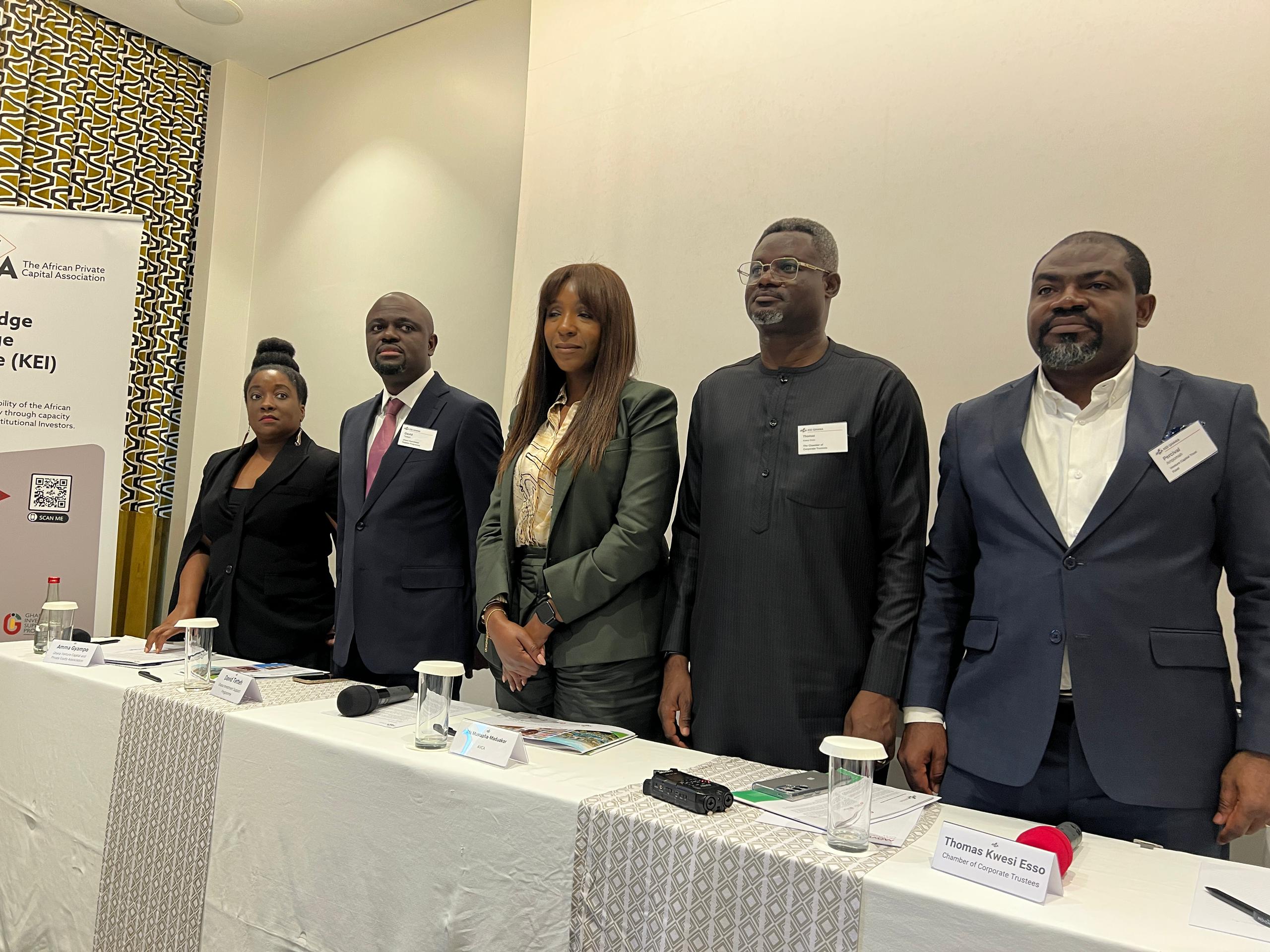
Accra, Ghana// –– A latest report by the African Private Capital Association (AVCA) has revealed that Ghana’s Pension funds could unlock over $1 billion for private capital investment in the country.
The new report, launched in Accra today with support from the Chamber of Corporate Trustees of Ghana and British International Investment through the Ghana Investment Support Programme (GHISP) provides the most comprehensive assessment to date of how Ghanaian pension funds could drive long-term investment into productive sectors in one of Africa’s fastest-growing pension markets.
Addressing journalists at the launch of the report titled-‘Pension Funds and Private Capital in Ghana’, Chief Executive Officer of AVCA, Abi Mustapha-Maduakor flanked by Madam Amma Gyampo of Ghana Venture Capital and Private Equity Association; David Tetteh, Ghana Investment Support Programme; Percival Ampomah, Venture Capital Trust Fund; and Thomas Kwesi Esso, Executive Secretary of Chamber of Corporate Trustees noted that the report underscored the disconnect between the rapid growth of Ghana’s pension industry and its limited allocation to private capital.
Madam Mustapha-Maduakor added that with total pension assets under management reaching GHS 86.4 billion ($6.2 billion) by end-2024, the industry had grown into a key pillar for long-term domestic savings.
In her own words: “Ghana’s pension funds are at an inflexion point. The data highlights both the scale of investable domestic capital and the practical barriers that continue to hold it back”.
She continued unlocking this potential would require a combination of regulatory clarity, institutional capacity-building, and deeper collaboration between fund managers and local investors.
“This mirrors a broader shift across Africa, where governments are enacting policies to channel domestic savings into productive investments at home and across borders. With these foundations in place, Ghana’s pension system can become a catalyst for long-term, sustainable growth”, Madam Mustapha-Maduakor told the journalists.
In her remarks at the media briefing, Madam Gyampo said: “We are working closely with AVCA and happy to see Ghana as the pilot destination for this programme. This demonstrates that we need to do more and double down on
capacity building and education about the asset class”.
She noted that the need for a diversification is very clear in terms of asset class diversification, pension funds, and foreign exchange diversification.
“So, the case is very clear, is just that as Venture Capital and Private Equity Association, industry ecosystems to work more closely together with our regulators and policymakers to ensure that we achieve the allocations that we have”, Madam Gyampo added.
Whereas regulatory reforms and new investment directives signal progress, four categories of barriers continue to limit deeper participation: regulatory constraints, including complex fund licensing processes; market challenges such as limited investable pipelines; structural gaps in data transparency and institutional capacity; and GP-related issues, with 89% of pension funds interacting with fewer than three fund managers in the past year.
65% of respondents in the research intend to increase exposure to private equity within five years. This momentum is supported by the government’s May 2025 directive encouraging pension funds and insurers to allocate at least 5% of assets to private equity and venture capital by 2026, signalling a crucial step toward mobilising long-term domestic capital for development.
The report projected a steady increase in allocations over the next five years, positioning Ghana as a potential leader in pension-led private capital mobilisation across West Africa.
Despite progress made, Ghana falls behind more advanced regional peers in deploying pension assets to alternatives, utilising just 4.4% of its 25% limit, compared to Nigeria’s 34% usage of a 5% cap and South Africa’s c.8% allocation under its 15% regulatory ceiling.
This mirrors a wider continental pattern of underutilisation, with many markets yet to seize progressive regulations and maturing investment ecosystems.
This gap illustrates how Ghana’s pension system, despite its size and sophistication, remains underexposed to productive investments that could strengthen private sector growth and reduce reliance on short-term securities.
Adopting capital allocation strategies aligned with impact and national development priorities, the report notes that Ghanaian pension funds prioritise investments in healthcare (55%), agribusiness (45%), and technology (40%).
By asset class, 38% favour real assets such as property and infrastructure, 24% prefer private equity, and 19% are exploring venture capital, signalling a shift from passive accumulation to active deployment.
Many favour DFI-backed vehicles (28%) for their de-risking role and co-investment models (22%) that enable shared due diligence and provide investment protection.
The report outlines four strategic priorities to deepen pension participation in private markets:
- Enhancing data transparency and engagement between funds and managers
- Building institutional capacity through targeted training and pooled investment structures
- Deploying blended finance and co-investment tools to mitigate risk
- Advancing regulatory reforms to recognise Limited Partnerships and streamline fund licensing.
The research forms part of AVCA’s broader Knowledge Exchange Initiative (KEI), a twelve-month capacity-building programme launched with BII support through GHISP, to strengthen local institutional participation in private markets.


